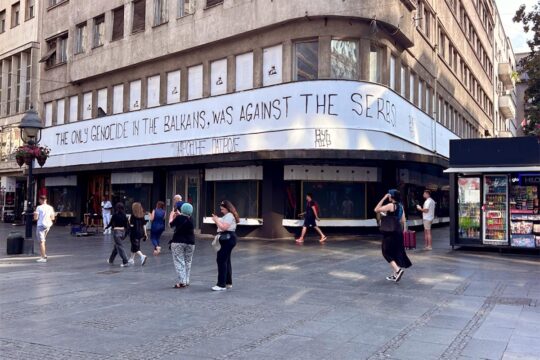Nearly six decades after its war of independence from France, Algeria's relations with the former colonial power can still be tense -- even fractious -- despite Paris' recent attempts at rapprochement.
With a new stand-off after French President Emmanuel Macron accused Algiers' "political-military" regime of distorted history, we look at their complicated post-colonial relationship.
- 1962: Independence -
Algeria becomes independent on July 5, 1962 after an eight-year war that ends 132 years of often brutal colonial rule when Paris regarded it as an integral part of France.
French historians say half a million civilians and combattants died -- 400,000 of them Algerian -- while the Algerian authorities insist 1.5 million were killed.
- Exodus -
In the space of a few months one million "pieds-noirs" -- or settlers of European extraction -- flee to France where they live alongside Algerian immigrants and become one of the pillars of the French far right.
At least 55,000 Algerians who fought for the French, known as "Harkis", are massacred in Algeria, although Harki groups say three times as many perished.
Another 60,000 end up in squalid internment camps in France.
In October 1963 Algeria nationalises all remaining land owned by Europeans.
The last French military bases close between 1967 and 1970.
- 1971: Nationalisation -
In February 1971 president Houari Boumediene -- who had overthrown Algeria's first president Ahmed Ben Bella six years before -- nationalises oil pipelines and French oil companies there.
Two months later Paris deprives Algeria of "privileged" trading status.
- 1975: First visit -
Valery Giscard d'Estaing becomes the first French president to visit Algeria since independence in April 1975.
For the first time since 1962, French flags flutter on Algiers' grand boulevards.
His successor Francois Mitterrand says "France and Algeria are capable of getting over the trauma of the past" during a visit in November 1981.
The following year Chadli Bendjedid becomes the first Algerian president to make an official visit to France.
- 1990s: Islamist violence -
In September 1993 two French geologists are kidnapped and their throats cut by Islamists who took up arms against the Algerian government the previous year.
The following December the Armed Islamic Group (GIA) hijacks an Air France plane in Algiers. The hostage-taking ends in the French city of Marseille with four terrorists killed when French forces storm the aircraft.
In revenge, four Catholic priests, three of them French, are killed east of Algiers.
Between July and October 1995 a wave of GIA attacks in France leave 10 dead and 200 wounded.
In March 1996 France is shocked by the murder of seven Trappist monks taken from their monastery at Tibhirine.
- 2005: 'Positive colonialism' -
Three years after president Abdelaziz Bouteflika visits France in 2000 his French opposite number Jacques Chirac returns the favour and signs the "Declaration of Algiers" to try to improve relations despite the "still painful past... without forgetting of denying" what had happened.
But in February 2005, a French law requiring teachers to stress "the positive role of colonisation" goes down like a lead balloon in Algiers. Bouteflika says it shows France's "blinkered negationist and revisionist" mindset.
The following year the law is annulled.
But Algiers demands an official apology for French atrocities during the colonial period as a precursor for any treaty of friendship.
At the end of 2007, then French president Nicolas Sarkozy denounces the colonial system while on a visit to Algiers but appeals to Algerians to "look to the future".
His successor Francois Hollande formally recognises the "suffering that French colonialism inflicted" on the Algerian people during a state visit.
- 2017: Enter Macron -
Emmanuel Macron, the first French president to be born after the war, goes further than any of his predecessors to bridge the gap.
He angered the French right before his election in 2017 by saying the conquest of Algeria involved "crimes and acts of barbarism" that would today be seen as "crimes against humanity".
He orders an eminent Algerian-born French historian, Benjamin Stora, to draw up a report on French colonisation and the war of independence.
- 2020: Algerian anger -
In June 2020, Algeria recalls its ambassador in France after French television shows a documentary about the weekly anti-government "Hirak" street protests there.
In January 2021, Stora hands in his report, which makes a series of recommendations including the creation a "memory and truth commission".
It does not suggest a formal state apology, and Macron says he will not give in to Algiers' demands for one. Instead he says he will make "symbolic gestures" to attempt to reconcile the two countries.
Algiers rejects the report, saying it lacks "official recognition of the war crimes and crimes against humanity committed by France during the 130 years that it occupied Algeria."
- 2021: History 'rewritten' -
In April French Prime Minister Jean Castex's visit to Algiers is postponed at the last minute amid rumours of a new chill in relations.
Last month Macron asked for "forgiveness" from the families of Harkis.
On Saturday Algiers recalls its ambassador over reported comments by Macron that Algeria's post-independence "political-military system" had "totally re-written" the country's history.
acm/fg/dv
AIR FRANCE-KLM


